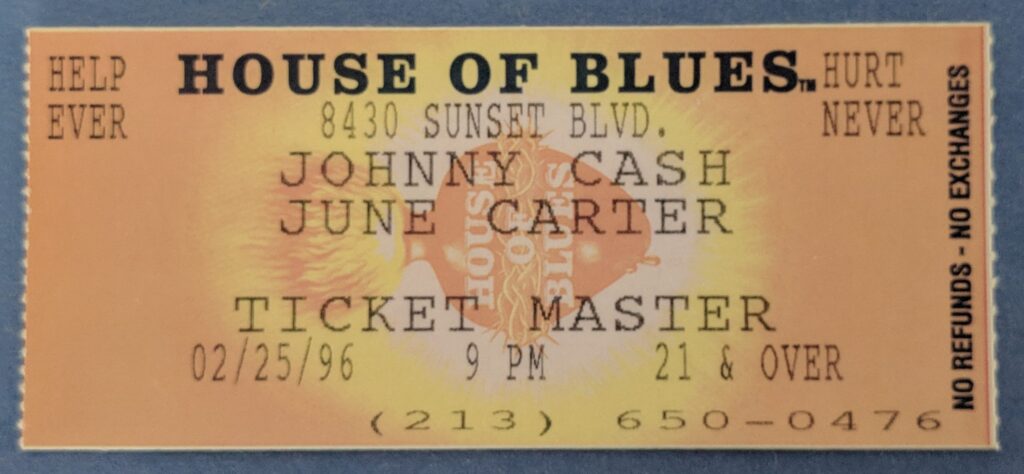June Carter and Johnny Cash

June signed a CD for me while we were hanging in her kitchen.
At home with June Carter and Johnny Cash
“Dean, would you like a tour of the house?” I did not want to impose on June Carter Cash, but I wasn’t completely insane either. Of course I wanted to see where she and Johnny Cash hung their hats.
It was May 1999, and June and Johnny were hosting several hundred people at their home in Hendersonville, Tenn. We were celebrating the release of Press On, a remarkable acoustic album June had recorded in a log cabin with family and friends. A big tent was set up on the tennis court, and nothing stronger than cider and Coca-Cola was on offer.
Fellow country music survivor George Jones popped in briefly, three days after appearing in court to plead guilty to drunk-driving charges stemming from a near-fatal car wreck. I chased after him as he returned to his limo, breathlessly congratulated him on surviving his latest crash—he said it was a close call—and I asked if he’d mind signing the official program for me, which he did graciously.
On that sweltering Saturday afternoon, a perspiring Johnny in his usual black garb was surrounded by well-wishers. He looked bad, sported a pair of hearing aids, and his hair was surprisingly thin. Still, he was a huge presence in the tent. I kept my distance. What on earth could I say to him that he hadn’t heard before? Instead, I contented myself to let a cute young blonde rub my bald head for luck.
June was sitting at one of the tables reading a folder of press clippings. I had interviewed her on the phone two weeks earlier, so that was my “in” to sidle up to her, introduce myself and tell her that my article was probably there somewhere. June introduced me to family friend Jane Seymour and her husband. Then came the invitation. I faked reluctance, probably quite poorly, but she insisted, and said she would show me around afterwards.
A little later June took the stage. “Her time is now,” Johnny told the crowd. “I’ve encouraged it all these years, to let people know what she has to offer … Now you know.” When Johnny joined her on the Terry Smith gospel standard “Far-Side Banks of Jordan,” a paean to eternal love, country star Naomi Judd started crying and retreated to the house.
Afterwards, June and I walked arm-in-arm back to the sprawling wooden abode where I was formally introduced to Naomi. I told her she was even more beautiful in real life (as her husband looked on). It’s a pity her actress daughter Ashley Judd wasn’t there; my charm needle was at 11 that night. Also on hand was the actress Diane Ladd, who was delightfully nutty and kissed me on the cheek, and her husband Robert, whom I called Bruce (the name of her first husband). June asked one of her assistants, Ramona, to take Diane, Robert and me on the tour. Actually, ‘lady-in-waiting’ is probably a better term for Ramona. She was one of a coterie of middle-aged ladies hanging around the house, not really doing much.
“My mother, she was the dominant personality in the household. There’s no doubt,” John Carter Cash, the couple’s only child together, explained to me a few years later. “She liked having a lot of people around her to help her and to support her. She had a lot of employees. It was just their way of existence. I didn’t always feel totally comfortable there after a while, y’know?”
The house appeared to be totally feminized, with rooms full of tables and cabinets groaning under the weight of untold dinner services. Piles of plates, bowls, crystal, cutlery and related artifacts gave it the unfortunate appearance of a junk store. The furniture was heavy on floral upholstery. Every nook and cranny was crammed with mementos and tchotchkes. I joked that June and my grandmother should get together to discuss their aggressive acquisition habits.

Johnny Cash, one of the greatest American men ever, had been assigned a small upstairs den, where his Grammys and other trophies were displayed in an open cabinet. A small day bed ran alongside one of the walls. Clearly, this was June’s house, and Johnny was merely a guest.
A group of us gathered in the kitchen/living room area. Jane Seymour took up residence on a couch. June touched my forearm for effect whenever she told a joke, and gave me an autographed copy of her CD. But she also shot me a steely stare while I was talking to Johnny’s niece, Kelly. I excitedly remembered that Kelly’s parents and Johnny had been sued by the U.S. government for accidentally causing a California forest fire in 1965. The incident bolstered Johnny’s badass credentials, but June did not need another reminder. Johnny was not part of the post-party festivities, alas. He was resting in the master bedroom, not feeling great.
Four years later to the day, June Carter Cash died. Johnny followed her four months later.
(But wait! There’s more. Buy Strange Days here to see what else happened.)
Copyright 2023. Dean Goodman. All Rights Reserved.